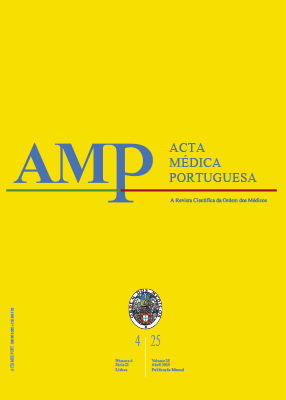Perception of Health-Related Quality of Life in Stroke Patients in a Continuing Care Unit: A Follow-Up Study
DOI:
https://doi.org/10.20344/amp.22181Keywords:
Aftercare, Perception, Quality of Life, Stroke, Stroke RehabilitationAbstract
Stroke continues to be one of the main causes of death in Portugal, with a prevalence rate of 8% in individuals aged 50 or over. The objectives of this study were to evaluate the perception of quality of life (QoL) related to health in patients with stroke, after discharge from the Integrated Continuing Care Unit (UCCI), and to evaluate the factors that influence health-related QoL. An observational, longitudinal and descJá agora riptive study was carried out with patients aged 65 years or older with a history of stroke and hospital discharge in central Portugal. They were observed in two time points: six and 12 months after discharge from the UCCI. Data was collected using self-completion questionnaires, namely the Portuguese version of the Stroke Scale Quality of Life (SS-QoL). Considering follow-up losses, a total of 128 individuals were included. All SS-QoL dimensions showed improvements from six to 12 months post-discharge. The variables “personality” and “mental capacity” showed the best evolution. The present study allows us to understand the evolution of the QoL of these users, including the most affected factors over time and that influence post-stroke rehabilitation.
Downloads
References
Pimentel J, Ferro J. Neurologia: princípios, diagnóstico e tratamento. Lisboa: Lidel; 2006.
Rubin E, Gorstein F, Rubin R, Schwarting R, Strayer D. Patologia – bases clinicopatológicas da medicina. 4ª ed. São Paulo: Editora Guanabara Koogan, SA; 2005.
Neves D. Acidente vascular cerebral: causas, primeira abordagem e tratamento. Universidade de Coimbra. 2021. [consultado 2023 fev 20]. Disponível em: https://estudogeral.uc.pt/bitstream/10316/99121/1/David%20Neves%20Documento%20Unico.pdf.
Pucciarelli G, Ausili D, Rebora P, Arisido M, Simeone S, Alvaro R. Formal and informal care after stroke: a longitudinal analysis of survivors’ post rehabilitation hospital discharge. J Adv Nurs. 2019;75: 2495-505.
Sociedade Portuguesa de Medicina Interna. O AVC é a principal causa de morte e incapacidade em Portugal. 2021. [consultado 2023 mar 12]. Disponível em: https://www.spmi.pt/o-avc-e-a-principal-causa-demorte-e-incapacidade-em-portugal/.
Moura A, Teixeira F, Amorim M, Henriques A, Nogueira C, Alves E. A scoping review on studies about the quality of life of informal caregivers of stroke survivors. Qual Life Res. 2022;31:1013-32.
Krug K, Miksch A, Peters-Klimm F, Engeser P, Szecsenyi J. Correlation between patient quality of life in palliative care and burden of their family caregivers: a prospective observational cohort study. BMC Palliat Care. 2016;15:4.
Oliveira M, Orsini, M. Escalas de avaliação da qualidade de vida em pacientes brasileiros após acidente vascular encefálico. Revista Neurociências, 2009;17:255-62.
Rehman A, Niazi R, Rehman H, Javed A. Assessment of quality of life of stroke survivors and their caregivers presenting to a tertiary care hospital in Pakistan. J Pak Med Assoc. 2022;72:2180-3.
Downloads
Published
How to Cite
Issue
Section
License
Copyright (c) 2025 Acta Médica Portuguesa

This work is licensed under a Creative Commons Attribution-NonCommercial 4.0 International License.
All the articles published in the AMP are open access and comply with the requirements of funding agencies or academic institutions. The AMP is governed by the terms of the Creative Commons ‘Attribution – Non-Commercial Use - (CC-BY-NC)’ license, regarding the use by third parties.
It is the author’s responsibility to obtain approval for the reproduction of figures, tables, etc. from other publications.
Upon acceptance of an article for publication, the authors will be asked to complete the ICMJE “Copyright Liability and Copyright Sharing Statement “(http://www.actamedicaportuguesa.com/info/AMP-NormasPublicacao.pdf) and the “Declaration of Potential Conflicts of Interest” (http:// www.icmje.org/conflicts-of-interest). An e-mail will be sent to the corresponding author to acknowledge receipt of the manuscript.
After publication, the authors are authorised to make their articles available in repositories of their institutions of origin, as long as they always mention where they were published and according to the Creative Commons license.









